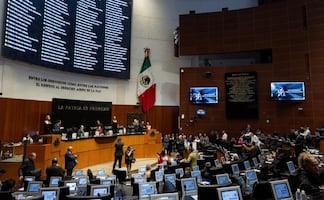Más Información

Avala Senado en fast track ingreso de 19 marines armados de EU a México; arribarán al país el próximo 15 de febrero

Ratifican nombramiento de nueva embajadora en Guatemala; SRE no indica motivos de remoción de Romeo Ruiz Armenta

"Está 2 a 1 arriba"; Manuel Velasco destapa a Ruth González para suceder a su esposo, Ricardo Gallardo, en gubernatura de SLP

Noroña señala que existen presiones de EU a la 4T; advierte que tropas no deberían ingresar a México "ni a sembrar arbolitos"

Layda Sansores acusa a Monreal de entrometido y lo exhorta a “cuidar su chiquero”; "amor y paz", le responde

Harfuch reporta ataque armado a elementos de Semar en El Limoncito, Culiacán; caen 9 presuntos delincuentes y muere un agresor
Mexico
is considered the most Catholic country in the world, but for the last decades, it has gone through accelerated changes and transformations regarding religious diversity.
“Currently there are many changes, rearrangements, and re-compositions in the heart of Catholicism . Catholics are, at the same time, more Catholics in their own way, but are taking more distance from the institution, dogmas, values, and norms, and they are even rehabilitating other forms of believing and practices very differents from those dictated by the Catholic hierarchy,” said Renée de la Torre Castellanos , of the Center for Research and Higher Studies in Social Anthropology.
During the presentation of the National Survey of Religious Beliefs and Practices in Mexico 2016 , he reported that, of the interviewed people, 4.9% said they do not practice any religion and 10.4% changed it or left it.
Among those who do not practice any religion some said that it is because they consider themselves “ freethinkers ” and that all doctrines are false. The percentage of devout persons who have changed or abandoned their religion predominates among Catholics , with 57.1% , and in second place are Jehovah's Witnesses , with 11.2%.
“The survey marks a very important variable of change and the first concern is dissatisfaction , meaning, the formal structures of Ecclesiastic Catholicism are unsatisfactory for people,” commented Bernardo Barranco , a sociologist specialized in religious beliefs and culture.
Of the people who identified with and practice a religion, 41.8% said they are believers because of tradition. The belief as a result of conviction registered 28.3% ; those who practice their faith in their own way were 17.9,% ; and persons who practice a dogma 5.3% .
Alexandra Haas Paciuc
, head of the National Council to Prevent Discrimination (Conapred) said that in Mexico there is currently no discussion about discrimination against religious beliefs .
“Religious minorities face rejection, lack of acceptance and discrimination. Almost a third of the minorities has suffered mocking, criticism, and lack of respect,” Haas informed and also asked authorities to oppose any kind of exclusion based on religion or any other motive.
The poll indicated that 90.4% of the persons agreed on the fact that members of any religious cult must have the same rights granted by the State.
mr
Noticias según tus intereses
[Publicidad]
[Publicidad]








